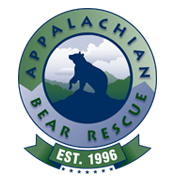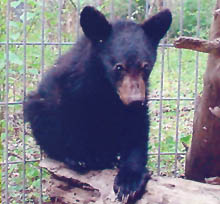 In April one year a TWRA officer rescued a bear cub who was being attacked by dogs. He was quick to answer the call about it even though he risked injury to himself to save the cub.
In April one year a TWRA officer rescued a bear cub who was being attacked by dogs. He was quick to answer the call about it even though he risked injury to himself to save the cub.
The officer immediately took the cub to UT Veterinary Hospital for examination, where it was determined that he should be transferred to ABR. When he arrived at ABR he was placed in a smaller holding pen that allowed ABR staff to closely monitor Lucky during his recovery. He had suffered a previous injury (and broken femur) that had healed, and he was now facing the challenge of being severely malnurished and dehydrated. During the exam it was learned that Lucky was a yearling and significantly underweight. He had apparently gone into hibernation very underweight and had come out of hibernation even more depleted than ever.
It was critical that he immediately gain weight and strength in order to overcome the hardships he had recently experienced. His chances of survival at a weight of 12 pounds were nil if it had not been for the immediate response and rescue by the TWRA officer.
When Lucky settled in at ABR he immediately chomped on an apple and a few nuts that had been given him, but he was too weak to forage for food. In normal cases bears in the ABR facility are not allowed to associate food with humans. The bears used to be fed and watered by feeding tubes that led to bowls in the enclosure. But Lucky’s case was different. So for the next three weeks he was fed by placing food directly in front of him, and his daily intake was noted.
His eagerness for food finally gave him the push he needed to start recovering, and in the days that followed he grew stronger and began foraging for his food. He eventually was released into the more spacious, natural setting of the wild bear enclosure where he became, in normal bear fashion, ‘Mr. Elusive’ who no longer wanted anything to do with humans.
After a few months at ABR he and two companions were released — a successful end to Lucky’s very hard start in life!


